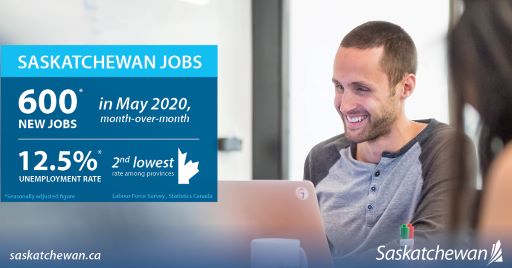Released on June 5, 2020
Job numbers for May released today show Saskatchewan is in a strong position compared to other provinces. The unemployment rate in May 2020 was 12.5 per cent (seasonally adjusted), the second lowest among the provinces. Nationally, the unemployment rate was 13.7 per cent.
“The Saskatchewan workforce is still being seriously affected by the COVID-19 pandemic but there are a number of signs that show Saskatchewan’s economy is both recovering faster, and was less impacted, than other provinces,” Immigration and Career Training Minister Jeremy Harrison said. “We have the second lowest unemployment rate in Canada and the number of people working rose in May, which is a strong, positive sign in the COVID-19 era. The Saskatchewan economy is positioned to strongly improve as we move forward with the Re-Open Saskatchewan plan.”
On a month-over-month basis, there were 600 more jobs in May than in April (seasonally adjusted). Total employment has declined 13 per cent and 87 per cent of those working in February in Saskatchewan were working in May.

Compared to February, the total actual hours worked by those employed in Saskatchewan in May has declined by 9.1 per cent, the second lowest decline in Canada. The national average decline in that period is 19.3 per cent.
“Looking forward, we are seeing positive economic news in Saskatchewan, including announcements about helium and lithium recently,” Harrison said. “These new investments will bring jobs and investment to communities across the province and will help lift our economy out of the current challenges facing markets globally.”
Saskatchewan businesses have also fared better than other jurisdictions, with fewer closing here than in other provinces. This speaks to the strength of Saskatchewan’s economy and a strong re-opening plan aiding in economic recovery.
According to the Canadian Federation of Independent Business, Saskatchewan's business barometer index grew by 7.1 points in the second half of May 2020 compared to the first half – the highest growth among provinces compared to a 0.7 point decline in the national index.
In April 2020, Saskatchewan’s urban housing starts had the second highest year-over-year growth among provinces at 87.5 per cent, compared to the national decline of 29.7 per cent (seasonally unadjusted).
-30-
For more information, contact:
Deb Young
Immigration and Career Training
Regina
Phone: 306-531-9530
Email: deb.young@gov.sk.ca

